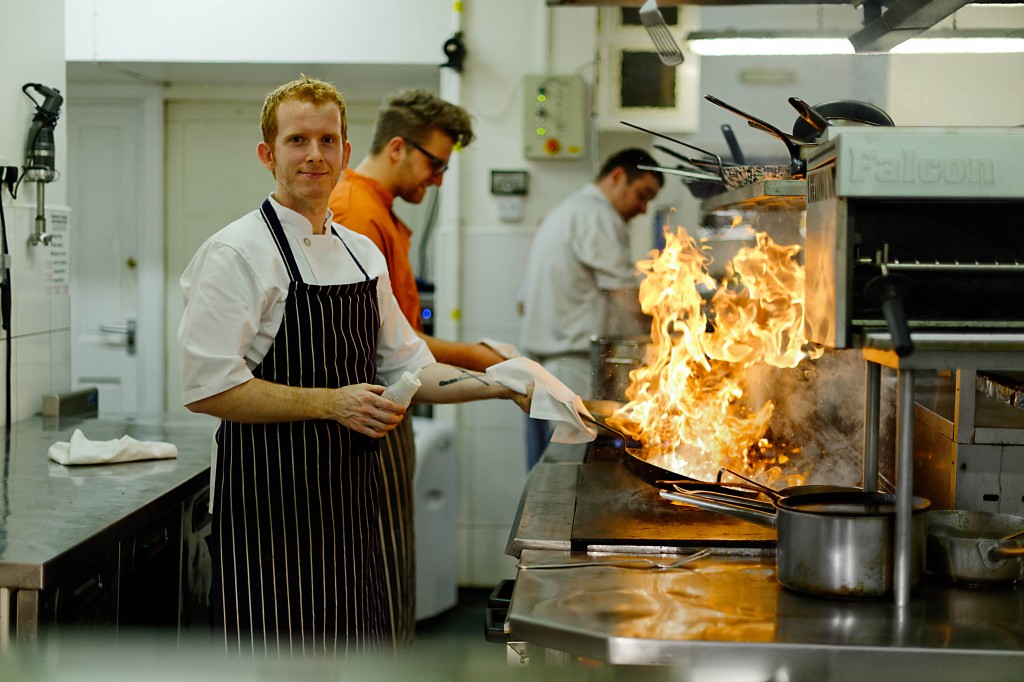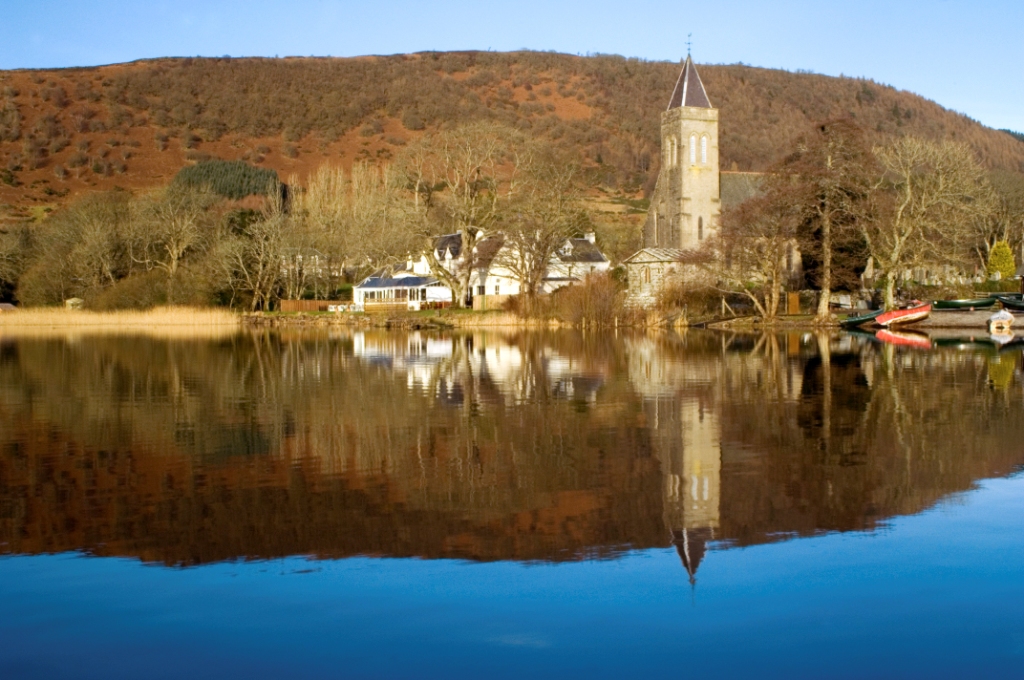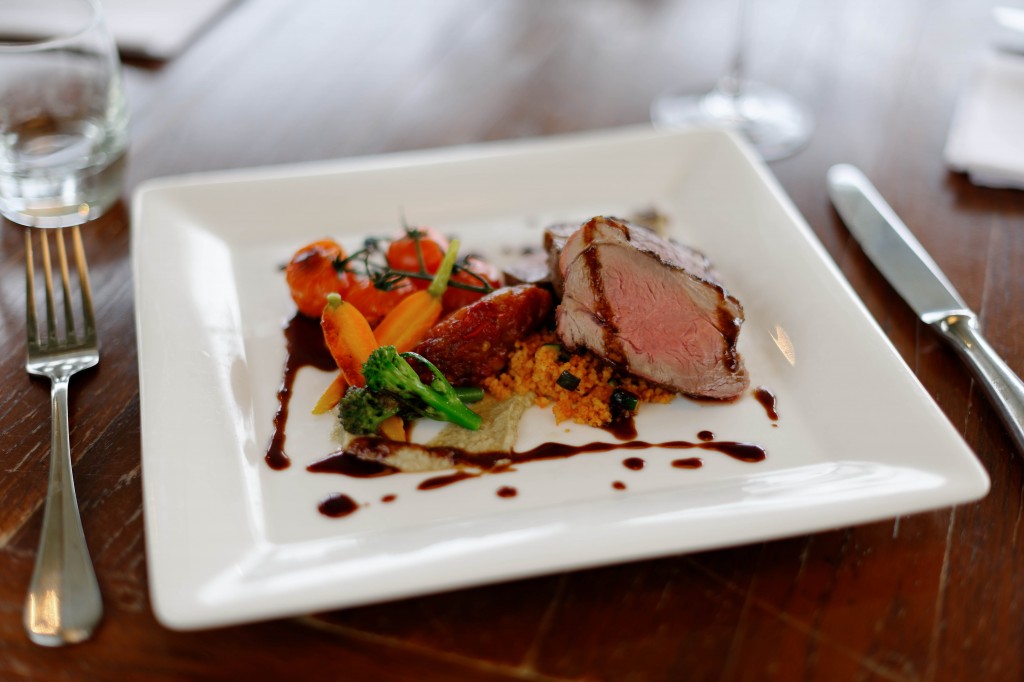
Daniel Bryant is the Head Chef at The Lake of Menteith Hotel in The Trossachs National Park. His career has taken him to both Australia and America where he cooked at the Menteith hotel’s sister restaurant – The Robert Morris Inn in Maryland.
As he gears up for this evening’s Australian wine dinner at the hotel, Daniel chats to the 5pm Dining blog about his influences; the differences between cooking in the UK and the USA plus the fantastic local produce available at The Lake of Menteith Hotel.
Can you describe the style of food served at the restaurant?
DB: It’s Modern British so it’s influenced by flavours from all over the world rather than traditional meat and two veg on a plate. There are ethnic flavours in there along with European flavours. We use local ingredients, like the amazing venison or game that we get around here, and work them with different flavours, be they from the Middle East or Eastern European. It’s Scottish food but with additional flavours from elsewhere.
You have worked in the States. What differences did you find when cheffing in the States?
DB: The chef I was working for had trained all over Europe so the food we cooked was European in many ways but made with American ingredients. I was on the eastern shore and had access to incredible soft shell crabs, scallops, rock fish, sea bass and magnificent oysters from Chesapeake Bay.
There would be a lot of different flavours in the dishes. For example, a British salad can be quite dull and boring. With an American salad, there is always something going on. You are constantly finding another ingredient, another flavour, another layer. I like that.
Did you find that American customers have different expectations?
DB: In a way. They are up for new flavours and new approaches. They are not stuck in their ways. Some British customers still want to see a bit of meat on a plate with two veg, one of which is a starch. You wouldn’t need to do that in America. They are a bit more open-minded about what they are having.
The hotel was in the country but not too far south of Washington DC, Baltimore. It’s just below the Mason Dixon line so it’s a little bit southern. There was an appetite for really traditional food like fried chicken and collard greens but also an appetite for less traditional flavours. It was a good mix.
At The Lake of Menteith, is there any one dish which is outstandingly popular?
DB: During the season, it’s trout. We get trout straight from the Lake. People are eating trout which could easily have been in the water one hour previously. You can’t get fresher than that. It is not unusual for guests who are staying here to bring a fish in and say ‘Can I have that for my dinner, please?’

What started you off in the kitchen?
DB: I used to cook with my grandma when I was a kid. I used to grow my own vegetables and cooking them was just taking it a step further.
I was set to do law at university but first I thought I would take a gap year and do a catering course at Colchester Institute. I just loved it.
I couldn’t see myself being stuck in an office all day when I could be doing this. I wanted to do a job that was fun and creative every day and being a chef fitted that. Every day is different. I’m lucky here in that the boss pretty much gives me free reign as long as people like it.
Is there any ingredient that you prefer to work with?
DB: I like the fact that the produce here is seasonal. Each season is different and gives you great game or shellfish or lamb. I like that variety.
You have a rare night off. Where do you eat out?
DB: There are a couple of good places locally. The Mhor places do interesting things. I try to get into the cities as well to see what is happening. Food is constantly changing and it’s good to see what is in fashion.
There is an argument that Glasgow has the most exciting restaurants in Scotland at the moment. Does that ring true for you?
DB: You could argue that they don’t have to conform as much as Edinburgh restaurants perhaps do. Glasgow can be a bit grungier and perhaps be a little more free-thinking. Having said that, I went to Timberyard in Edinburgh last month and thought that was very exciting and completely out there. The menu had a lot of interesting combinations.
Has there been any chef that inspired you?
DB: Hugh Fearnley-Whittingstall. When I was growing up, that whole local produce idea and the notion that food doesn’t have to be completely messed around with really appealed. Some times, just being simple is the best approach.
I grew up watching Hugh. Now, I like what Yotam Ottolenghi does. His food is incredible. I ate in his restaurant the last time I was in London and it was amazing.
Who would cook your fantasy meal?
DB: Yotam Ottolenghi. He would make a meal that featured amazing combinations of flavours. Nothing too fancy but done really well. He isn’t one of these chefs where it’s all about the sous vide and so on. It’s traditional cooking but done in a modern way. I think he would be good chat as well. He has seen a bit of the world and he is a character.
What’s the best thing about being a chef?
DB: It’s the people you work with. Chefs are definitely a different breed of people. There is always good banter. You might be working sixteen or seventeen hour days but it feels as though you are part of a family. When you go to work, you know you are going to work hard but you are going to have a good laugh doing it.
And the worst?
DB: The rise in the number of people who think they have a food allergy can be hard to swallow. Of course, there are people with genuine issues and we will always do our best to accommodate them. Some times, there seems to be confusion between an allergy and a dislike.
Tell us about your most memorable meal?
DB: In America, I went to a restaurant called Minibar in Washington DC. The Head Chef is José Andrés who used to be at El Bulli. There are only twelve seats and they do a 35 course tasting menu. It took the best part of a year to get a seat there but it was incredible. There were two chefs cooking in front of us. We could talk to them and touch the ingredients.
It was liquid nitrogen and sous vide; it was a modern, chemical approach. Even though it is not the way I cook, it was impressive to watch. That was my best meal.

